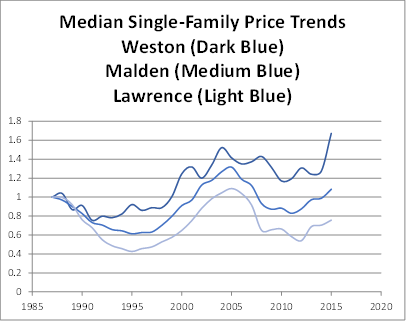Residential, The Bottom Line
This study delves into a matter that could be considered in a political light:
which stratum of homeowners has profited the most from home ownership in the past
28 years? The purpose of this study is not to be political. It is simply to
set forth facts.
As measured by trends in single-family prices, inflation has caused all segments
of the Greater Boston market to increase in value. The rates of increase from
1987 to 2015 are as follows:
Weston (the high end): up 277% from 1987 to 2015
Malden (the middle): up 144% from 1987 to 2015
Lawrence (the low end): up 70% from 1987 to 2015
Expressed as a compound rate of return, the overall results from 1987 to 2015 are as follows:
Weston: up 4.85% per year, compounded
Malden: up 3.24% per year, compounded
Lawrence: up 1.93% per year, compounded
Inflation explains much of the change. Stripped of inflation, the results are as follows:
Weston: up 67% from 1987 to 2015
Malden: up 8% from 1987 to 2015
Lawrence: down 24% from 1987 to 2015

The bottom line is this. Without inflation, a dollar invested in a Weston house
in 1987 grew in value to $1.67. A dollar invested in a Lawrence house declined
to $.76.
Without being political, we can say this: as with other measures, such as measures
of income, for the past 28 years, the gap in the value of this asset, the single-family
house, has widened between the high end and the rest.
What does this mean for commercial property valuation? It means that appraisers
should be aware of the demographics of the communities where they make appraisals.
We make appraisals of buildings. But what is happening to the people in the
buildings is important to building valuation as well.
What is well known is that gains in income over the past 30 years have gone more
to high-income people than to low-income people. How that translates into an
effect on property values isn't known until we make a study like the one
presented here. As we might have expected, house prices for people at the high
end have gone up much more than have house prices for people at the low end.
It is not enough for an appraiser to know that incomes and prices for real estate
have gone up at a particular rate for an entire metropolitan area. It is important
to know the demographic trends community by community. The income trend for a
community is likely to translate into a price trend for various types of real
estate in that community - houses, apartments, and even retail.
About Us
Eric Reenstierna Associates LLC is a real estate appraisal firm taking on valuation and consultation assignments in Greater Boston, Massachusetts and New England. Eric Reenstierna, MAI, is the office's principal and is a commercial real estate appraiser.
Explore
Contact
24 Thorndike Street
Cambridge, Massachusetts 02141
(617) 577-0096
ericreen@tiac.net
